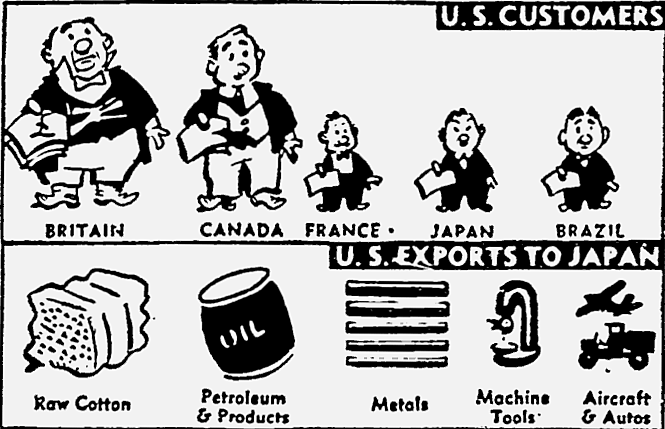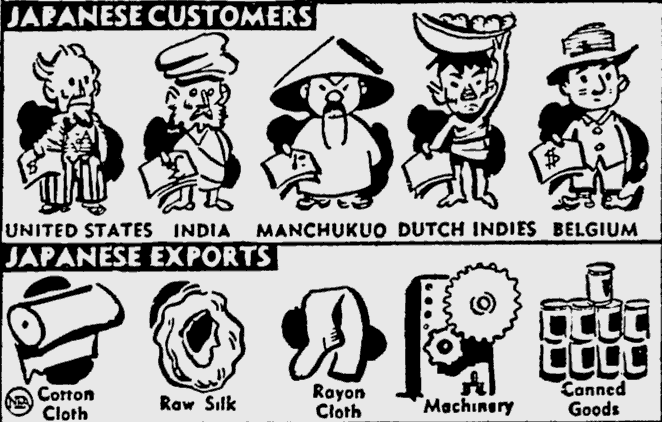U.S. JOINS BRITAIN IN PREPARING FOR POSSIBLE WAR WITH JAPAN
…
America leads Axis opponents on new economic offensive; troops on the alert
…
BULLETIN
Tokyo, July 27 –
The Japanese Dōmei News Agency reported today from Nanking that the government of Gen. Chiang Kai-shek had granted the United States and Great Britain permission to use Chinese air bases. The Chinese government was said to have also agreed to permit American and British officers to command some Chinese air units.
By Harrison Salisbury, United Press staff writer
The democracies prepared today for a possible military showdown with Japan in the Far East.
The United States and the British Empire were already engaged ion economic war with the nation which American and British statesmen have denounced for “aggression” against French Indochina and there were indications that a military war was nmpt considered beyond the realm of possibility.
President Roosevelt ordered Philippine troops placed under the command of the United States armed forces. American soldiers in Hawaii were placed in a “precautionary alert basis,” parachute troops from Fort Benning, Ga., were established at the Panama Canal, and streams of airplanes were en route to Manila and Singapore.
MacArthur named
General Douglas A. MacArthur, 61-year-old former Chief of Staff, today was placed in command of a new Army component to be known as the U.S. Army Forces in the Far East.
General MacArthur, who has been military adviser to the Philippine Commonwealth since 1935, will head all U.S. Army forces as well as the Philippine military groups.
MacArthur will have the rank of temporary lieutenant general.
James V. Forrestal, Under Secretary of the Navy, and Admiral John Towers of the Naval Bureau of Aeronautics were flying from San Francisco to Honolulu.
On the offensive
The anti-Axis powers were on the offensive around the world, led by American action in snapping trade ties with Japan by freezing the assets and credits of the island empire in the United States, Britain also froze Japanese credits and swung the British Dominions, India and colonies into line.
Japan replied in kind to the democracies’ freezing of Japanese assets and the Japanese Dōmei news agency hinted that Thailand, French Indochina’s neighbor, might be the next nation to be drawn into the Far Eastern crisis. The Thailand government, Dōmei said, met in emergency session to “combat Anglo-American encirclement” and gave order for its air force to “make full preparation for any eventuality.”
Demands on Thailand
In Chungking, China, the Board of Military Operations reported that Japan had demanded Thailand’s adherence to the “New Order of East Asia,” in return for which Thailand was to be given the Laos and Cambodia areas of French Indochina.
The Board of Military Operations also reported that Japan had dispatched 21 troop transports from Canton to the southwest toward Indochina on July 20-21. Three cruisers, 23 submarines and two aircraft carriers were said to have sailed from Shikoku on July 21.
In the Far East, the democracies appeared to be striking their most telling blows. The full economic power of the British Empire, covering a quarter of the globe, was directed against the Japanese along with that of the United States.
The joint action in freezing Japanese assets – and the repudiation of Japanese commercial treaties by the British – meant that Japan had lost the bulk of its export and import markets.
The Japanese, who have been obtaining much of their war materials from the United States in the last two years, described the United States’ action as “economic war” and said the future of Japanese-American relations would depend on how far the United States went in its attempts to restrict Japanese commerce.
The Yokohama Silk Exchange, hub of the island empire’s export industry, closed and cotton spinners and other textile organizations called emergency meetings to discuss how to meet the economic threat to their existence. Shares on the Tokyo Stock Exchange dropped.
Dutch consider action
Meanwhile, the Dutch government sought collective security with Britain and Australia and considered what economic action to take in connection with the Anglo-American measures.
Ther Dutch, like the British, were believed to feel that Japanese occupation of Indochina, athwart the Pacific routes to the East Indies, Australasia, the Philippines and India, was a threat to their possessions.
Meanwhile, Canada became the first nation of the British Commonwealth to act against Japanese shipping as well as freezing assets. At Vancouver, a Japanese vessel loaded with hemlock was impounded as it was about to sail.
United States Army authorities in Manila estimated that President Roosevelt’s order would add about 200,000 Filipino troops to the forces guarding the Philippines. In Washington, however, ther number of Filipino effectives was believed to be no more than 75,000.
The United States in recent months has sent many long-range bombers to both the Philippines and Singapore. The British were said to have 60,000 seasoned Australian, British and Indian troops in British Malaya plus about 60,000 Malayans.
Troops to Canal
Washington revealed that units of the newly organized U.S. parachute troops have been sent from Fort Benning, Ga., to reinforce American defenses in the Panama Canal Zone. These units are now effectively disposed to rush to the protection to any South American points in event of emergency. Additional bombardment, reconnaissance and anti-aircraft units have also been sent to the zone.
Japanese spokesmen attempted to minimize the effects of the freezing of her assets and her loss of markets upon Japan’s economy but emergency sessions were called by Japanese textile industries which fate loss of virtually all markets except the Japanese control bloc in East Asia.
Tokyo did not immediately impose on Britain the freezing restrictions ordered against the United States.
But there was no hint in Tokyo of any turning back. Japanese planes and warships prepared to move into Indochinese bases over the weekend.

